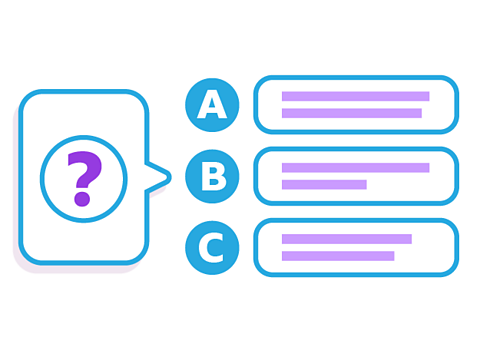Key points about indefinite pronouns in Spanish

indefinite pronounPronouns that are used to refer to someone or something in a general way, without being specific about whom or what youāre referring to. can substitute nounThe name of a thing such as an object, a place or a person. Nouns are often described as naming words. in a sentence.
The indefinite pronouns ²¹±ō²µĆŗ²Ō and ²Ō¾±²Ō²µĆŗ²Ō need to agree in gender (when possible) and in number with the noun they are substituting.
Algo and alguien are not gender or number specific.
Indefinite pronouns
In Spanish, the indefinite pronouns are:
Sorry, something went wrongCheck your connection, refresh the page and try again. - a/an/some/any
Sorry, something went wrongCheck your connection, refresh the page and try again. - something
Sorry, something went wrongCheck your connection, refresh the page and try again. - ²Ō“Ē/²Ō“Ē³Łā¦a²Ō²ā
Sorry, something went wrongCheck your connection, refresh the page and try again. - someone
Learn more about indefinite adjectives in Spanish in this guide.
As with adjectives, the indefinite pronouns ²¹±ō²µĆŗ²Ō and ²Ō¾±²Ō²µĆŗ²Ō agree in gender (when possible) and in number with the noun they are substituting as follows:
| Masculine singular | Feminine singular | Masculine plural | Feminine plural | Meaning |
|---|---|---|---|---|
| ²¹±ō²µĆŗ²Ō | alguna | algunos | algunas | a/an/some/any |
| ²Ō¾±²Ō²µĆŗ²Ō | ninguna | ningunos | ningunas | ²Ō“Ē/²Ō“Ē³Łā¦a²Ō²ā |
Note that the accent is only used on ²¹±ō²µĆŗ²Ō and ²Ō¾±²Ō²µĆŗ²Ō in the masculine singular form.
Algo and alguien do not change according to gender or number.
Indefinite pronouns are similar to indefinite adjectives and, most of the time, they look exactly the same. However, while an indefinite adjective will accompany and modify a noun, indefinite pronouns substitute nouns. This means they will not be modifying any noun nor will they be accompanying it. They function by themselves.
How to use the indefinite pronoun 'algo'
Algo is a pronoun that is not gender or number specific. Since algo refers to something unknown or unspecified, it will not agree with anything and so its ending will not change.
For example:
ĀæQuieres algo? - Do you want something?
Algo no va bien. - Something isnāt right.
How to use the indefinite pronoun 'alguien'
Alguien is a pronoun that is not gender or number specific. Since alguien refers to someone unknown or unspecified, its ending will not change whether we know the number of people referred to or not.
For example:
Vi a alguien. - I saw someone.
Alguien estĆ” llamando a la puerta. - Someone is knocking on the door.
How to use the indefinite pronoun 'alguno/a/os/as'
Alguno/alguna/algunos/algunas can be used to refer to people, things, animals, thoughts and ideas.
For example:
ĀæTe queda alguno? - Do you have any left?
Alguno/alguna/algunos/algunas must agree with in gender and in number with the noun they are substituting.
For example:
Necesito un bolĆgrafo. ĀæTienes alguno? - I need a pen. Do you have one?
Necessito una camisa blanca. ĀæMe prestas alguna? - I need a red shirt. Can you lend me one?
Tengo muchos caramelos. ĀæQuieres algunos? - I have a lot of sweets. Do you want any?
Quiero comprar unas manzanas, Tienes algunas? - I want to buy some apples. Do you have any?
How to use the indefinite pronoun 'ninguno/a/os/as'
Ninguno/nunguna/ningunos/ningunas can be used to refer to people, things, animals, thoughts and ideas in the negative, meaning no or none.
Negation rules apply so you also need to put no at the beginning of the sentence.
For example:
No queda ninguno. - There is none left.
You do not need no at the start of the sentence if the first word of the sentence is ninguno/nunguna/ningunos/ningunas.
For example:
Ninguna queda. - None is left.
Ninguno/nunguna/ningunos/ningunas must agree with in gender and in number with the noun they are substituting as follows:
| Masculine singular | ninguno | No tenemos ninguno. | We do not have any. |
| Feminine singular | ninguna | Ninguna queda. | None is left. |
| Masculine plural | ningunos | No compramos ningunos. | We do not buy any. |
| Feminine plural | ningunas | No venden ningunas. | They do not sell any. |
Indefinite pronouns - Mini quiz

Fill in the blank with the correct form of the indefinite article to translate this sentence:
We donāt want any.
No queremos _______.
No queremos ninguno.
Ninguno is used because the item being referred to is masculine singular.
Quiz - Indefinite pronouns
Practise what you've learned about indefinite pronouns in Spanish with this quiz.
Now you have learned about indefinite pronouns in Spanish why not explore quantifiers and intensifiers?
More on Pronouns
Find out more by working through a topic
- count9 of 9

- count1 of 9

- count2 of 9

- count3 of 9
